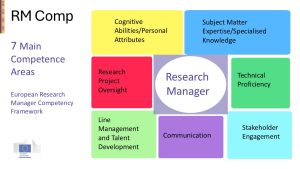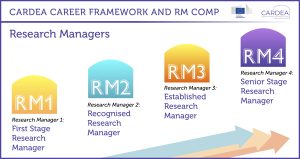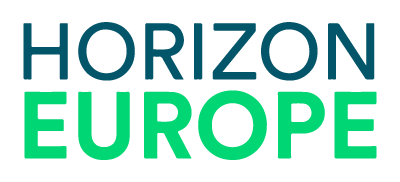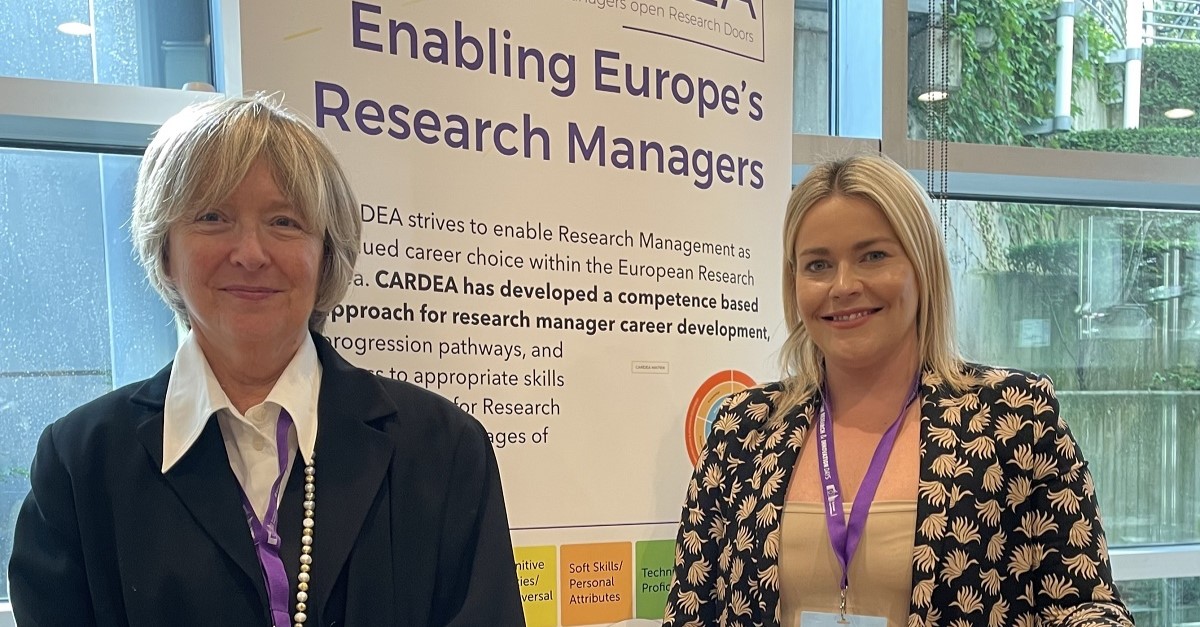Pictured, L-R: Mary Kate O’Regan and Dr Olivia O’Leary, UCC
An Irish-led consortium has developed a standardised definition for the role of Research Managers in Europe. With Horizon Europe funding of €1.5 million, the CARDEA group has facilitated formal recognition of the role for the first time by developing a Competency Framework, a Career Progression Model, and training and development programmes that will establish professional research management as a valued career choice within the European Research Area (ERA).
Led by Mary Kate O’Regan, HR Business Manager Research at University College Cork (UCC), CARDEA – Career Acknowledgement for Research (Managers) Delivering for the European Area – is a consortium primarily comprised of HR professionals with a proven track record in the delivery of initiatives to support research staff within their own universities and organisations. Members come from Ireland (UCC), Greece, (Centre for Research and Technology Hellas) Belgium (University of Liege), Croatia (Juraj Dobrila University of Pula), Italy (University of Macerata), Poland (The Institute of Nuclear Physics of Polish Academy of Sciences), Romania (National University of Science and Technology Politehnica Bucharest) and Catalonia, Spain (AGAUR).
The CARDEA project has its origins in Mary Kate O’Regan’s work in Irish research institutions including the Tyndall National Institute and UCC. “I managed the TMD Research Centre in Tyndall and that gave me real insights into how research is managed and operationalised in a large organisation,” she explains. “As HR Business Manager for Research at UCC I also work closely with principal investigators, academics, researchers and research managers.”
An essential yet invisible role
Through that work Mary Kate developed an appreciation for the essential role research managers have to play in the successful achievement of Europe’s research and innovation ambitions. For a variety of reasons, however, research management has remained almost invisible as a profession despite its fundamental importance to successful project outcomes. Her contacts through the HR Excellence in Research European Commission initiative with other HR professionals in many European academic and research institutions revealed a lack of consistency between EU countries in policy, employment conditions and professional pathways for research managers.
In 2021, a call for proposals was issued under Action 17 of the European Research Area (ERA) Policy Agenda aimed at enhancing the strategic capacity of Europe’s public research-performing organisations. Mary Kate reached out to her network of contacts and assembled the CARDEA consortium to put forward a proposal for a project to support the development of research management careers in Europe.
“The name CARDEA comes from the Ancient Roman goddess of the hinge,” she explains. “It’s all about research managers and how they open research doors. We applied for funding under the call and were awarded €1.5 million in 2022.”
Defining the problem
The first step was to develop a knowledge base both to define the problem and shape solutions. “We conducted a survey of 800 research managers working in the European Research Area. They asked for a clear and standardised definition of the role, for a competency framework, a career progression model, training and development and training toolkits, training needs analysis tools, and a professional development framework. That’s what we set out to give them.”
Among the key challenges faced was the absence of a standard terminology to describe the role of research managers. Even job titles varied widely. As a result, it was decided to treat Research Manager as an umbrella term to cover all such roles and to develop a competence framework which would define the different skills and competencies of research managers.
Supporting career progression by identifying skills gaps
The competency framework (RM Comp) developed by CARDEA in collaboration with RM Roadmap was validated and published by the European Commission in 2025. It identifies the key skills and competencies needed for effective research management and supports professional growth.#

It helps individual research managers to identify career paths, skill gaps and training needs. It also helps research performing organisations to standardise employment practices and enable staff development for research managers.
Overlaying that is the Capability Maturity Model  which sets out the different levels of career progression for Research Managers from basic (RM 1) to the most advanced (RM 4). This supports career advancement by enabling research managers to fill skills gaps and move forward in their careers.
which sets out the different levels of career progression for Research Managers from basic (RM 1) to the most advanced (RM 4). This supports career advancement by enabling research managers to fill skills gaps and move forward in their careers.
Meeting the skills needs
The CARDEA consortium has developed a knowledge, skills and abilities self-assessment tool to enable research managers to establish what training they require, and skills gaps they need to fill in order to advance their careers. This is accompanied by the Training Needs Analysis – a guided assessment tool which can be used by both individuals and organisations. CARDEA has also developed a Professional Development Plan for Research Managers Workbook, inclusive of templates to guide individual managers and research performing managers in their training and development efforts. Mentoring and reflection resources have also been developed.
Completing the circle is the CARDEA Academy (www.cardeahub.eu) which addresses the specific needs of research managers by offering a variety of open access free training and development programmes, resources, and toolkits to help them develop and advance their careers. The hub offers a flexible, self-paced learning resource to enable Research Managers professional development to complement their busy role.
The CARDEA Consortium has also developed a proposed European Charter for Research Managers which is currently with the European Commission for discussion and approval. This is a set of principles designed to establish and promote the development of professional and rewarding careers in research management, thereby supporting excellence in research and innovation across the European Research Area (ERA). This charter provides a framework to support and promote the visibility of Research Managers’ positive role within the European research ecosystem and aims to outline their rights, responsibilities, and professional development opportunities while also detailing the responsibilities of employers, funders, and policymakers in fostering a collaborative, innovative, and effective research environment.
Finally, the CARDEA consortium is currently working on standards for benchmarked and indexed salaries for Research Managers in the European Research Areas.
The overall CARDEA project is rooted in the principle that the best research necessarily requires the best support, which means excellent Research Managers working in a common Europe-wide framework. Europe now has structures for Research Managers and an acknowledged Research Manager career path with an accompanying competency, accreditation and training architecture where none existed before CARDEA.
For the future, the ultimate ambition is to see the RM1 to RM4 classification framework included in budget templates for proposals for all European Commission funded research projects. “Where the European Commission goes the member states will follow,” says Mary Kate.
If you would like more information or advice about accessing Horizon Europe support, please contact horizonsupport@enterprise-ireland.com or visit Horizon Europe Ireland.
Ends



